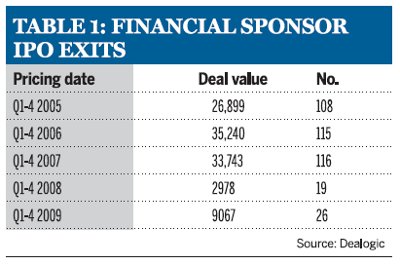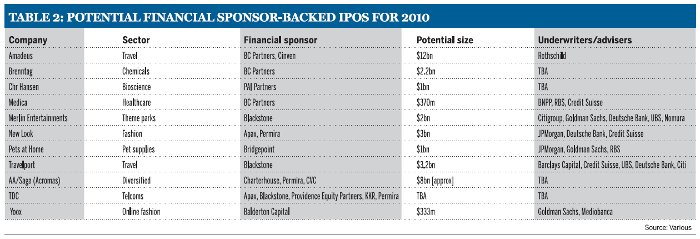The projected stream of initial public offerings in 2010, many on the back of private equity exits, may encounter a frosty market. Sceptical investors will demand aggressive valuations and some question whether the market is yet ready, or indeed has the capacity, for a recovery in IPO issuance. Writer Charlie Corbett
What had been a murmur in the final quarter of 2009 is rapidly becoming a roar. Speculation about a boom in initial public offerings (IPOs) in 2010 is now rife. Investment bankers, brimming with a renewed optimism, talk energetically about the ever-growing pipeline of new offerings waiting to hit the market. After a year in which the obituary had well and truly been written for IPO issuance, it turns out there is life in the equity capital markets yet. Almost 20 IPOs have been announced already this year, on the back of a busier-than-expected fourth quarter in 2009.
The optimism is unsurprising. The global macroeconomic situation has shown signs of improvement and equity markets across the world have been on an upward trajectory since the nadir of early 2009. Institutional and retail investors appear to be sitting on a mountain of cash, waiting for the right opportunity to plough back into the market. On the supply side, corporate financiers are licking their lips at the prospect of the return of a raft of companies looking to raise new money in 2010.
Such issuance will be driven in large part by corporate carve-outs as the world's biggest financial institutions and companies look to sell off assets, raise much-needed funds and streamline their operations. More attention, however, has focused on the return to the markets of private equity.
A year to forget
After a year that most financial sponsors would rather forget, the time appears to be ripe to exit from many of their investments, repay debt and start returning capital to investors. The colossal amounts of debt accumulated by the leveraged buy-outs of 2006 and 2007 came home to roost in 2009. It was a year dominated by non-performance at best and defaults and restructuring at worst. According to ratings agency Standard and Poor's (S&P), there were 48 defaults among a selected portfolio of speculative grade companies in the first six months of 2009 alone, up from just six in the previous corresponding period.
The fallout is still very much apparent. In December it was reported that one of private equity's leading lights, Candover, was forced to terminate a €3bn buy-out fund after the group's listed arm found it was unable to meet its own €1bn commitment. Similarly, French private equity firm PAI Partners was forced to cut its €5.4bn fund in half late last year. In January this year, lenders took control of UK estate agent Foxtons, which was acquired by BC Partners in 2007.
However, the onus is gradually moving away from mere survival and towards growth opportunities. Despite a recent S&P estimate that $400bn of debt in the industry is coming up for renewal over the next five years, there is optimism that this will not put off potential investors in new financial sponsor issuance.
According to Manish Shah, private equity partner at consultancy Deloitte, private equity firms are readying themselves for a busy year. "The industry has, encouragingly, taken stock of the problems it faces, both internally within their portfolios, including supplementing the strength of management teams, and externally, with issues such as availability of debt, and is taking steps to address them," he says.
Heading for the exit
Blackstone, the US private equity group, told investors it plans to float eight companies this year. In Europe, Permira has promised to return a 'wall of cash' to investors and BC Partners is readying an estimated $10bn worth of exits.
So what is driving this rush to exit? Critically, after 18 months of poor performance, private equity firms feel it is time to show their investors some returns. For many, it is a matter of urgency since their funds are reaching the end of their investment cycle and the time has come to raise money once again. Returning money to investors creates capacity for further investment in the future. This is particularly important since history has shown that the best performing private equity buy-outs have always come in the two years after a recession.
A more pressing concern for some, however, is paying down debt, and it remains to be seen how strong demand will be for this kind of issuance in 2010. The financial crisis has fundamentally changed the relationship between institutional investors and their private equity managers. The balance of power has shifted strongly towards the investor. For Kurt Björklund, co-managing partner of Permira, the past two years have been an exercise in back to basics for the industry. "We've had to focus on very substantial and quick reactions to a changing market, which is where I think the private equity model works very well," he says.
There is deep-seated scepticism among some, however, and the prospect of a raft of deals all coming at once from the same quarter is likely to set off a few alarm bells. "We are experiencing an investor base that is sceptical. They see everyone coming back in one go and they want to see a strong IPO discount," says one senior equity capital markets specialist in London.
Late last year the owners of Unitymedia, Germany's second largest cable company, decided against launching an IPO and chose instead to sell directly to international cable company Liberty Media. The decision not to offer shares publicly was perhaps a reflection of nervousness about potential demand. When asset manager Gartmore, backed by US private equity shop Hellman & Friedman, chose the IPO route in December last year, it was forced to scale back the issue and cut the price by almost 16% from the mid-point of its target price range.
A question of demand
Private equity managers are well aware of a potential reticence among investors towards backing a raft of new issues from financial sponsors, but emphasise that the right deals will always succeed. "Our initial soundings of institutional investors have been pretty consistent and suggest that they want to see certain things in companies coming to market," says Andrew Newington, managing partner at BC Partners in London. "They want the companies that come to market to be large enough to be meaningful, they want to see that the investors have added value during their period of ownership, so it's not just a quick flip, and finally they want to see compelling value."
Institutional investors will be highly selective in their investment decisions and do not necessarily have as much spare cash as anticipated. According to Christian Hess, European head of the financial sponsor group at investment bank UBS, investors have more choice now than perhaps they thought they would have six months ago. "It is true that there is an awful lot of cash on the sidelines [but] that is mostly in mutual funds. The typical institutional investor, that drives the pricing in an IPO book, doesn't have much more than 2% to 3% of cash as working capital lying around, meaning they need to sell existing holdings to buy an IPO candidate," he says.
Decisions will be particularly influenced by how companies have performed over the past two years of recession, rather than solely by earnings projections.
"Investors will be cautious about businesses that have a substantial downside risk in a double-dip scenario. They will be keen on companies that have demonstrated they can perform well in a recession environment," says Mr Björklund.
The return of alpha
For Lisa Carnoy, global head of equity capital markets at Bank of America Merrill Lynch, the focus of investors in 2010 is clear. "The one theme we saw [in late 2009] that did work well almost without exception was growth. All those deals that priced at the top of the range were all growth stories, without exception and regardless of sector," she says. After 18 months of recovering equity markets and with increasingly large obligations to meet, institutional investors are on the hunt for alpha once again. "There is a real scarcity of growth. Less than a quarter of those companies that are public are projecting a growth rate in the double digits," she says.
Recovery concerns
Looking ahead, the biggest concern for both financial sponsors and their investors will be the state of the global economy. The downturn is by no means at an end and economic recovery is still in a precarious phase. Any potential macroeconomic upset would send issuers and investors alike back into their bunkers. There is a chance that equity markets got ahead of themselves in 2009 leaving the potential for a mini-bubble. "Markets are telling you that they are pricing the recovery for perfection. Earnings will go up in 2010, they must from such a low base, but that is already reflected in the share price," says one head of equity capital markets in London. "Whatever goes wrong is going to have a pretty strong impact so we expect a return to higher volatility"
It is worth remembering that the pipeline of potential issuance from private equity sources is still very much that, a pipeline. Deals will be heavily scrutinised by investors and only the best will get out of the door. Many prospective IPOs might end up going to trade buyers instead. Valuations will be aggressive and the looming spectre of debt will continue to cast a shadow over financial sponsors.
"For those companies that want to come to market I think they will find a receptive audience but an audience that will need to be convinced both on value, but also that the companies in question are ready and right for the public markets," says Mr Newington.




